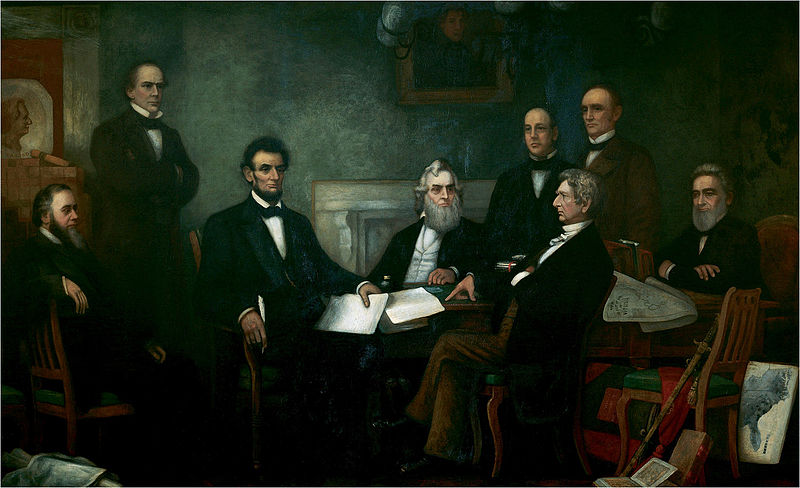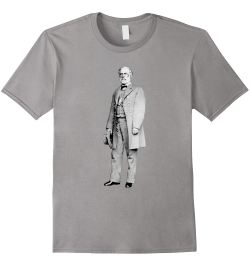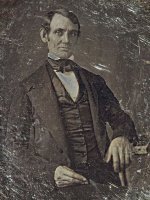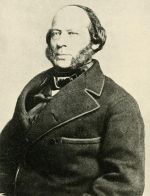Emancipation Proclamation Top Ten Facts
The Emancipation Proclamation is a very important document in the history of the United States. Unfortunately, many people don't really understand the true scope of this document.
If you ask most people what the Proclamation was all about, they will say, "It freed the slaves." That is a large overstatement; but at the same time, such an understanding of the Emancipation Proclamation completely misses much of the power of the act...
On this page, we will try to help you learn something new about the Emancipation Proclamation.
Here are ten facts about the formation, announcement, purposes, and results of the Emancipation Proclamation:
- Despite not being officially issued until January 1, 1863, Lincoln first proposed the Emancipation Proclamation to his cabinet in July of 1862 (above). It was decided that no such proclamation could be made without a Union victory to show that Lincoln had the power to enforce it.
- There was also resistance to the Emancipation Proclamation because it was feared that such an act might cause slave holding states within the Union to revolt and join the Confederacy. Such fears had already caused Lincoln to rescind the orders of two different Generals who had abolished slavery in the areas under their control. Lincoln even removed one of these men, General John C. Frémont, from office for a time.
- Though the Battle of Antietam was a draw, it served as the necessary victory; because, Lee retreated from Maryland after the battle. This "victory" gave Lincoln the confidence to issue the Preliminary Emancipation Proclamation (transcript below) five days after Antietam, on September 22, 1862.
- The Preliminary Emancipation Proclamation essentially threatened to free slaves in the states of the Confederacy, unless those states returned to the Union. Also, they "...may voluntarily adopt, immediate or gradual abolishment of slavery within their respective limits..." So, this document provided for the abolition of slavery, but did not give any timetable for its accomplishment.
- The official Emancipation Proclamation (transcript below) was issued on January 1, 1863, in which slaves held within the Confederacy were declared to be "...then, thenceforward, and forever free..."
- Slave holding states within the Union (Delaware, Maryland, Kentucky, Missouri, and West Virginia - when it became a state in June 1863), as well as certain counties in Louisiana and Virginia which were under Union control were not included in the Emancipation Proclamation. These areas were addressed thus, "...which excepted parts, are for the present, left precisely as if this proclamation were not issued." These slaves were not freed until the 13th Amendment was ratified in December 1865.
- Therefore, the Emancipation Proclamation didn't actually free any slaves. The slaves in the Confederacy weren't actually under Lincoln's control, and the slaves within the Union were specifically kept in slavery. The only freedom provided, was to those slaves within the Confederacy who could make their way across the Union lines, but there were other major impacts of the Proclamation.
- The Emancipation Proclamation made the abolition of slavery, at least within the Confederacy, a definite goal of the war. This was a shift from the previous official position that the war was to "Preserve the Union."
- Within the Emancipation Proclamation was a provision which allowed African-Americans to serve in the Union Army, "...such persons of suitable condition, will be received into the armed service of the United States..." Obviously, with the abolition of slavery becoming an official goal of the war, there was a great incentive for African-Americans to join the Union Army. This was a very important part of the Proclamation, as some 200,000 African-Americans served in the Union Army and Navy by the end of the war.
- The greatest impact of the Emancipation Proclamation was that it prevented European powers from coming to the aid of the Confederacy. The Confederacy was hoping very much for aid from either France or England, or both; but when it appeared that aiding the Confederacy would be supporting slavery, the possibility of European aid essentially disappeared. In my opinion, this was the foremost goal of the Emancipation Proclamation, and it succeeded brilliantly; but that is only my opinion, take it for what it's worth...
I hope these facts have helped you learn something about the purposes and results of the Emancipation Proclamation beyond just, "It freed the slaves." Below are included the transcripts of both the Preliminary Proclamation from September 22, 1862, and the official Emancipation Proclamation from January 1, 1863.
Transcript of the Preliminary Proclamation
By the President of the United States of America.
A Proclamation.
I, Abraham Lincoln, President of the United States of America, and Commander-in-Chief of the Army and Navy thereof, do hereby proclaim and declare that hereafter, as heretofore, the war will be prosecuted for the object of practically restoring the constitutional relation between the United States, and each of the States, and the people thereof, in which States that relation is, or may be, suspended or disturbed.
That it is my purpose, upon the next meeting of Congress to again recommend the adoption of a practical measure tendering pecuniary aid to the free acceptance or rejection of all slave States, so called, the people whereof may not then be in rebellion against the United States and which States may then have voluntarily adopted, or thereafter may voluntarily adopt, immediate or gradual abolishment of slavery within their respective limits; and that the effort to colonize persons of African descent, with their consent, upon this continent, or elsewhere, with the previously obtained consent of the Governments existing there, will be continued.
That on the first day of January in the year of our Lord, one thousand eight hundred and sixty-three, all persons held as slaves within any State, or designated part of a State, the people whereof shall then be in rebellion against the United States shall be then, thenceforward, and forever free; and the executive government of the United States, including the military and naval authority thereof, will recognize and maintain the freedom of such persons, and will do no act or acts to repress such persons, or any of them, in any efforts they may make for their actual freedom.
That the executive will, on the first day of January aforesaid, by proclamation, designate the States, and part of States, if any, in which the people thereof respectively, shall then be in rebellion against the United States; and the fact that any State, or the people thereof shall, on that day be, in good faith represented in the Congress of the United States, by members chosen thereto, at elections wherein a majority of the qualified voters of such State shall have participated, shall, in the absence of strong countervailing testimony, be deemed conclusive evidence that such State and the people thereof, are not then in rebellion against the United States.
That attention is hereby called to an Act of Congress entitled "An Act to make an additional Article of War" approved March 13, 1862, and which act is in the words and figure following:
"Be it enacted by the Senate and House of Representatives of the United States of America in Congress assembled, That hereafter the following shall be promulgated as an additional article of war for the government of the army of the United States, and shall be obeyed and observed as such:
"Article-All officers or persons in the military or naval service of the United States are prohibited from employing any of the forces under their respective commands for the purpose of returning fugitives from service or labor, who may have escaped from any persons to whom such service or labor is claimed to be due, and any officer who shall be found guilty by a court martial of violating this article shall be dismissed from the service.
"Sec.2. And be it further enacted, That this act shall take effect from and after its passage."
Also to the ninth and tenth sections of an act entitled "An Act to suppress Insurrection, to punish Treason and Rebellion, to seize and confiscate property of rebels, and for other purposes," approved July 17, 1862, and which sections are in the words and figures following:
"Sec.9. And be it further enacted, That all slaves of persons who shall hereafter be engaged in rebellion against the government of the United States, or who shall in any way give aid or comfort thereto, escaping from such persons and taking refuge within the lines of the army; and all slaves captured from such persons or deserted by them and coming under the control of the government of the United States; and all slaves of such persons found on (or) being within any place occupied by rebel forces and afterwards occupied by the forces of the United States, shall be deemed captives of war, and shall be forever free of their servitude and not again held as slaves.
"Sec.10. And be it further enacted, That no slave escaping into any State, Territory, or the District of Columbia, from any other State, shall be delivered up, or in any way impeded or hindered of his liberty, except for crime, or some offence against the laws, unless the person claiming said fugitive shall first make oath that the person to whom the labor or service of such fugitive is alleged to be due is his lawful owner, and has not borne arms against the United States in the present rebellion, nor in any way given aid and comfort thereto; and no person engaged in the military or naval service of the United States shall, under any pretence whatever, assume to decide on the validity of the claim of any person to the service or labor of any other person, or surrender up any such person to the claimant, on pain of being dismissed from the service."
And I do hereby enjoin upon and order all persons engaged in the military and naval service of the United States to observe, obey, and enforce, within their respective spheres of service, the act, and sections above recited.
And the executive will in due time recommend that all citizens of the United States who shall have remained loyal thereto throughout the rebellion, shall (upon the restoration of the constitutional relation between the United States, and their respective States, and people, if that relation shall have been suspended or disturbed) be compensated for all losses by acts of the United States, including the loss of slaves.
In witness whereof, I have hereunto set my hand, and caused the seal of the United States to be affixed.
Done at the City of Washington this twenty-second day of September, in the year of our Lord, one thousand, eight hundred and sixty-two, and of the Independence of the United States the eighty seventh.
[Signed:] Abraham Lincoln
By the President
[Signed:] William H. Seward
Secretary of State
(Preliminary Proclamation Transcript provided by the National Archives.)
The Transcript of the Emancipation Proclamation
By the President of the United States of America:
A Proclamation.
Whereas, on the twenty-second day of September, in the year of our Lord one thousand eight hundred and sixty-two, a proclamation was issued by the President of the United States, containing, among other things, the following, to wit:
"That on the first day of January, in the year of our Lord one thousand eight hundred and sixty-three, all persons held as slaves within any State or designated part of a State, the people whereof shall then be in rebellion against the United States, shall be then, thenceforward, and forever free; and the Executive Government of the United States, including the military and naval authority thereof, will recognize and maintain the freedom of such persons, and will do no act or acts to repress such persons, or any of them, in any efforts they may make for their actual freedom.
"That the Executive will, on the first day of January aforesaid, by proclamation, designate the States and parts of States, if any, in which the people thereof, respectively, shall then be in rebellion against the United States; and the fact that any State, or the people thereof, shall on that day be, in good faith, represented in the Congress of the United States by members chosen thereto at elections wherein a majority of the qualified voters of such State shall have participated, shall, in the absence of strong countervailing testimony, be deemed conclusive evidence that such State, and the people thereof, are not then in rebellion against the United States."
Now, therefore I, Abraham Lincoln, President of the United States, by virtue of the power in me vested as Commander-in-Chief, of the Army and Navy of the United States in time of actual armed rebellion against the authority and government of the United States, and as a fit and necessary war measure for suppressing said rebellion, do, on this first day of January, in the year of our Lord one thousand eight hundred and sixty-three, and in accordance with my purpose so to do publicly proclaimed for the full period of one hundred days, from the day first above mentioned, order and designate as the States and parts of States wherein the people thereof respectively, are this day in rebellion against the United States, the following, to wit:
Arkansas, Texas, Louisiana, (except the Parishes of St. Bernard, Plaquemines, Jefferson, St. John, St. Charles, St. James Ascension, Assumption, Terrebonne, Lafourche, St. Mary, St. Martin, and Orleans, including the City of New Orleans) Mississippi, Alabama, Florida, Georgia, South Carolina, North Carolina, and Virginia, (except the forty-eight counties designated as West Virginia, and also the counties of Berkley, Accomac, Northampton, Elizabeth City, York, Princess Ann, and Norfolk, including the cities of Norfolk and Portsmouth[)], and which excepted parts, are for the present, left precisely as if this proclamation were not issued.
And by virtue of the power, and for the purpose aforesaid, I do order and declare that all persons held as slaves within said designated States, and parts of States, are, and henceforward shall be free; and that the Executive government of the United States, including the military and naval authorities thereof, will recognize and maintain the freedom of said persons.
And I hereby enjoin upon the people so declared to be free to abstain from all violence, unless in necessary self-defence; and I recommend to them that, in all cases when allowed, they labor faithfully for reasonable wages.
And I further declare and make known, that such persons of suitable condition, will be received into the armed service of the United States to garrison forts, positions, stations, and other places, and to man vessels of all sorts in said service.
And upon this act, sincerely believed to be an act of justice, warranted by the Constitution, upon military necessity, I invoke the considerate judgment of mankind, and the gracious favor of Almighty God.
In witness whereof, I have hereunto set my hand and caused the seal of the United States to be affixed.
Done at the City of Washington, this first day of January, in the year of our Lord one thousand eight hundred and sixty three, and of the Independence of the United States of America the eighty-seventh.
By the President: ABRAHAM LINCOLN
WILLIAM H. SEWARD, Secretary of State.
(Emancipation Proclamation Transcript provided by the National Archives.)









New! Comments
Have your say about what you just read! Leave me a comment in the box below.